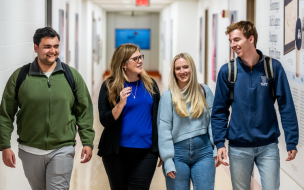With home campus options between Boston, San Francisco, London or Dubai, and rotation campuses adding the chance to study in Shanghai or New York, students are immersed in an international world, learning about the business world across as many as three continents during their studies.
Jasmin Elbert pursued a Masters in International Business at Hult International Business School for exactly that reason—she now works in a data analytics role for Google, where she currently works as a search and automation specialist, helping clients maximize their search engine optimization by analysing their data.
“[The Masters] really helped develop [my] soft skills,” she says, “which is really important in real life—I learned how to work in multicultural environments, how to communicate with other people, and how to identify strengths [within a team].”
Teamwork is harnessed through the Hult International Business School Business Challenge—students decide whether they want to enrol on the entrepreneurial track, where they incubate their own ideas, or the corporate track, where they work with a multinational company to solve a real-world business issue.
Jasmin opted for the corporate track and was placed in a diverse-rich team formed of people from different nationalities, industries, and backgrounds, working with consumer services company Lebara Limited—they hired her afterwards as a market research analyst, before she moved to IT services firm Accenture as a digital analyst.
Now at Google though, she’s seen how tech companies place large value on employees with a global mindset, as they look for people with an understanding of an array of cultures and personalities who can collaborate with their peers.
While there, she has begun to see the true value of the Masters in International Business from Hult International Business School.
“I think because nowadays you can do online courses and learn whatever you want, [companies like] Accenture and Google look [closely] at the soft skills,” she explains.
“They ask a lot of questions about how you would react in certain situations, and they look at your personality, and ability to solve problems by working together in a team.”
Though the emphasis on soft skills within the tech industry is growing exponentially, Hult International Business School also prepares students with all the hard knowledge they will need to succeed in the rapidly changing world of technology.
The school offers Nano courses in Disruptive Technologies, one-credit modules in topics such as Autonomous Vehicles, AI and Machine Learning, Robotics, and Blockchain.
These mini modules highlight the changing, innovative nature of Hult International Business School’s curriculum—the school keeps its students at the forefront of disruptive technology, keeping them abreast of all the latest developments.
On top of the Nano courses, MBA and Masters in International Business students also have the option to dive further into the world of tech by undertaking a further six months of study after they graduate, acquiring a Dual Masters in Business Analytics—which enables them to become data analysts, business analysts, or data science managers.
Throughout the Hult International Business School Business Challenge this knowledge is applied to the real world, as students meet with industry experts and practitioners who give feedback on their strategy and expose any weaknesses that need refined before the final project pitch—this happens repeatedly throughout the challenge, constantly offering students the chance to see how business theory works in practice.
“[That experience] gave me the opportunity to get a job quickly as it equipped me with valuable skills that I developed over the next couple of years,” Jasmin says.
Constant collaboration and feedback is mirrored in the real world of tech too, as the old-school, traditional method of hierarchical leadership begins to make way for a more collaborative, team-oriented system of work.
“Sometimes we don’t know the level of our colleagues,” explains Jasmin, “it feels like we are on one level, as one team.
“It’s very important to have different cultures and different genders in a team,” she concludes, “because it ensures you keep challenging yourself, and that is crucial for innovation.”
RECAPTHA :
5a
38
c5
cf




 2
2 




Comments.